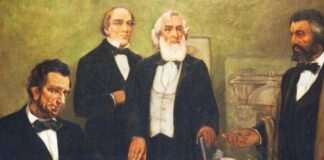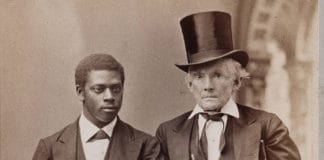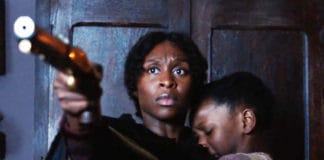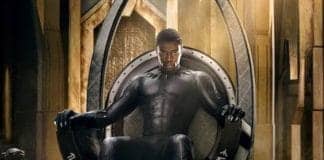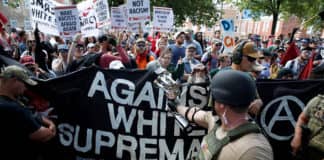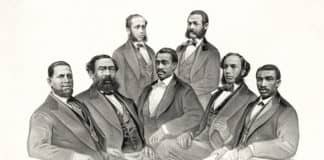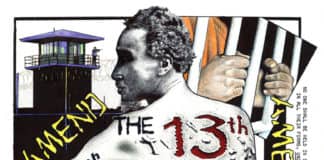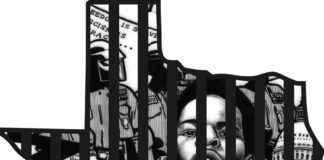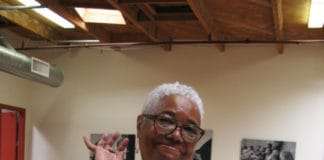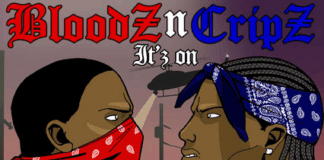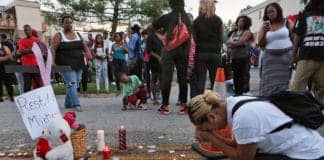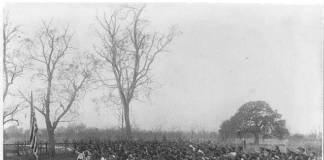Tags Civil War
Tag: Civil War
An interview with Oromo American human rights activist Seenaa Jimjimo on...
Four hundred Oromos refugees burned alive, Sen. Kuhn just in Ethiopia talking about genocide in Tigray, but never mentioned Oromia.
A Black storyteller chronicles the history of slavery and freedom
The richness and wholeness of spoken and written stories from one who can share from the connected personal places brings expanded value and substance to our own realities in the receiving of such wealth. Our own Fred Jordan bestows such a gift with his personal and enthusiastically explored window through history.
Let my people go! A call to release all US prisoners...
U.S. officials have often criticized Iran’s prison conditions. As awful as the prison conditions in Iran may be, Amerika, the proclaimed bastion of freedom and democracy, is much worse. Shane Bauer, the Amerikan captured and imprisoned for two years in Iran, bore witness to this.
How did the slavery clause get into the 13th Amendment?
Lincoln was a proponent of the convict lease system and saw it as a restricted form of slavery that the state could exploit and the people would accept. He said as much clearly in his letter to Alexander H. Stephens just four months before the start of the Civil War. [Alexander Hamilton Stephens was vice president of the Confederacy during the Civil War, 1861-65.]
Harriet as Igbo
by Biko Agozino
This is not a spoiler. “Harriet” is a film without spoilers because the audience already can tell how the movie was going...
‘Black Panther’: Reflection on cultural solidarity and historic debt
Black Panther in a nouveaux peacock chair making deals with the CIA! I am like hold up?! Are you out of your mind? This must be a slapstick thrown in to distract and confuse the audience who do not know their history and who probably believe it’s OK to share secrets with the U.S. government. Like Okoyo, the CIA is all about meddling in international affairs that threaten white supremacy and its economic and military dominance. Wakanda has a seat in the U.N. Council.
A historical perspective on the contemporary racial divide
Aug. 12, 2017, a myriad of white nationalist groups amalgamated in the city of Charlottesville to protest the removal of a Confederate Gen. Robert E. Lee statue. This “unite the right” white nationalist rally was the largest gathering in over a decade, according to ABC News. David Duke, the former grand-wizard of the Ku Klux Klan who is also an avid supporter of Donald Trump, was one of the organizers. During this rally they were met with counter-protestors.
How about erecting monuments to the heroes of Reconstruction?
There is an alternative politics of memory that Americans can also practice, and it might help to keep fascists out of public squares and do something concrete, literally at the same time: Honor Reconstruction. Remembering Reconstruction ought not to shunt aside the politics of Confederate memorials. Yet remembering this pivotal era certainly deserves to be built into the new national politics of memory. The sesquicentennial of Reconstruction is September 1, 2017.
On Dec. 6, 1865, Black bodies were nationalized – and our...
As I write this article, I am not sure what day the Civil War began or what day it ended. The facts that I do know about the Civil War are not worth repeating here, as that story already occupies plenty of space in American text. My muse, instead, is about the particular vestige of slavery that the Civil War bequeathed to us on Dec. 6, 1865, that now forms the basis of our struggle to end mass incarceration and prison slavery in 2017.
‘The public peace’: Race, class, control and the creation of the...
On April 19, 2015, Freddie Gray of Baltimore, Maryland, was murdered by officers of the Baltimore Police Department while in their custody. An article published in The Atlantic three days after Gray’s death pointed out the historical precedent for this particular kind of state violence. The author wrote, “Black men dying at the hands of the police is of course nothing new.” The “peculiar institution” of this violent and racist system can be better understood by tracing the lineage of the police back in time.
Texas locks down prison on Labor Day to avert work stoppage
On Labor Day here at the William P. Clements Unit, a prison in remote Amarillo, Texas, the prisoners awoke to a late breakfast: a single PBJ sandwich, a small bowl of dry cereal and no beverage. This grossly inadequate meal, which is our common fare during institution-wide lockdowns, signaled that a weeks- or months-long lockdown was in effect. Hunger pangs set in almost immediately.
Amend 13!
This is a public notice to all freedom fighters, activists and community leaders: SLAVERY IS NOT DEAD! Did the 13th Amendment abolish slavery? Ask anyone in the United States this question and they will answer most emphatically: Yes, of course it did. If you, the person reading this article and call to action, believe this as well, please allow me to inform you: You are wrong! Slavery is not dead! Rather than abolish slavery, the 13th Amendment LEGALIZED it!
1984: Confederate flag of slavery taken down from San Francisco Civic...
When Bree Newsome pulled down the Confederate flag from in front of the South Carolina statehouse in Columbia on June 27, she gave brief, heroic expression to an anger felt far beyond the Lowcountry over the bloody massacre in Charleston 10 days earlier. The young Black activist’s exemplary act of protest recalled a series of events three decades ago, not in a bastion of the Old South ruled by Republican nut jobs, but 2,500 miles away in liberal San Francisco.
The Bay Area’s best featured in SF International Arts Festival 2015
Classic Black (June 4 , 6 and 7, Southside Theater, Fort Mason Center) and A Night of Tribute in Dance: Blanche Brown (May 28, Cowell Theater, Fort Mason Center) are shining examples of the majestic spectrum of African American artistic excellence in the Bay Area and two of 150 performances that are part of SFIAF 2015. Co-presented by Fort Mason Center, SFIAF 2015 runs May 21-June 7.
Struggle without sacrifice is useless
Our 45-year protracted “civil war” between Damus (Bloods) and Kiwes (Crips) has probably claimed thousands of lives, if not millions, and it probably will claim a lot more lives if we don’t begin to change this vortex of violence that has plagued us as a people internally. The unifying of our strengths is basic to our people’s survival.
Rwandans protest Dutch support for Kagame dictatorship
Rwandan Dutch citizens and political asylum seekers in the Netherlands demonstrated in The Hague, the country’s capital, on Saturday, Nov. 29. They called on the Dutch government to stop supporting the dictatorship of Paul Kagame and stop deporting Rwandans at Kagame’s request. After watching the video of the demonstration, I spoke to Jean Flammé, a Belgian attorney for a Rwandan facing extradition for supporting Victoire Ingabire.
Let’s talk about Ferguson
I was born and raised in Missouri, so hopefully I can shed some light on how Ferguson, a little Missouri suburb of 21,000 people, became the focus of the nation, and even the world. I am getting the stench that they’re about to pull the pin on another grenade to throw that community into upheaval, so first let’s take a hard look at what they’ve been through and why. First of all, when we think of racism, we tend to think of Mississippi and Alabama due to the events of the ‘60s. However, Missouri was one of the bloodiest states during the Civil War because it was so divided – and it is still that divided today, as we’ve seen in Ferguson.
Wanda’s Picks for July 2014
The Glide Memorial Church family worked wonders at the celebration of San Francisco native Maya Angelou's life that she requested before she died. They juxtaposed carefully chosen visual moments with prerecorded Maya moments, which made her presence so palatable that the sanctuary lights came under the control of Spirit Maya and played with our collective vision – the room almost dark and the lights flickering off and on.
The first Memorial Day was Black
As we pause to remember the nation’s war dead, it’s worth remembering that Memorial Day was first celebrated by Black Union troops and free Black Americans in Charleston, South Carolina at the end of the Civil War. The free Black population of Charleston, primarily consisting of former slaves, engaged in a series of celebrations to proclaim the meaning of the war as they saw it.
Joe Debro on racism in construction, Part 4
Black labor and business in the North before 1862: Labor and business conditions were slightly better for Negroes in the North than in the South, but discriminatory practices were far from absent. Unlike the South, where slaves were protected in their crafts through the paternalistic assistance of their white masters, Northern free Negroes were faced with severe competition from immigrant workers who were preferred over native Blacks.

 Store
Store




